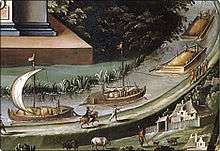Isaak van den Blocke
Izaak van den Blocke or Isaak van den Blocke (1574, Mechelen or Königsberg - 1626, Danzig) was a painter of Flemish descent who spent his active career in Poland.
Life

The details about his early life are scarce. Sources identify his place of birth either as Mechelen in the Southern Netherlands or Königsberg (then in Prussia and today Kaliningrad in Russia).[1] His father was Willem van den Blocke, a Flemish sculptor and architect who had trained with Cornelis Floris in Antwerp. His brother Abraham van den Blocke was an architect and sculptor and his brothers Jacob and David were painters.[2]
In 1584 the family moved to Danzig (modern Gdańsk, Poland). Here he likely received training by or worked in the workshop of Paul Vredeman de Vries and his father Hans Vredeman de Vries.[1]
He was the teacher of Laurence Neter.[1]
Van den Blocke died in Danzig around the same time as his father and brother Abraham, likely from an infectious disease.
Work

He was strongly influenced by the Northern Mannerism and the perspectival paintings of his presumed teachers Hans and Paul Vredeman de Vries. He drew his inspiration mainly from the Bible and mythology as well as contemporary subjects.
His principal work is the decoration of the ceiling (completed 1608) of the Great Chamber of the former main town hall in Danzig. This work was composed of 25 oil paintings on oak panels, with a central composition, an allegory to the glorious trade of Danzig (Apotheosis of Danzig). He also made paintings for the winter council room of the town hall (1611-1614).[3]
He received regular commissions from the city council, including figure paintings and the polychroming of buildings. He completed several assignments for churches in Danzig including the main altar of St Catherine's Church (together with Anton Möller).[1]
References
- 1 2 3 4 Biographical details of Isaak van den Blocke at the Netherlands Institute for Art History (Dutch)
- ↑ Biographical details of Willem van den Blocke at The Netherlands Institute for Art History (Dutch)
- ↑ Jerzy Kowalczyk and Bożena Steinborn. "Izaak van den Blocke." Grove Art Online. Oxford Art Online. Oxford University Press. Web. 26 May 2014
| Wikimedia Commons has media related to Izaak van den Blocke. |